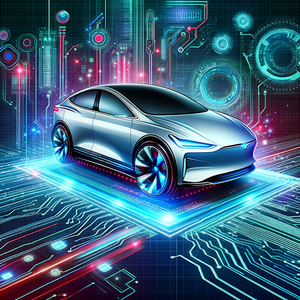The future is nearly here, and it is self-driving. The tantalizing promise of autonomous vehicles has captivated our imaginations, but as we race toward this new automotive era, we must ask ourselves — are we sacrificing more than we realize? A recent storm of articles touts the prospect of our cars becoming offices on wheels. The question is, should we allow a 'car office' to substitute for our living rooms or traditional workspaces? Are we ready to move from WFH to WFC - Work From Car?
Escaping the Office, from the Coffee-Infused Present to a Driverless Future
The allure of WFH (Working From Home) is undeniable. A short stroll to the laptop, the comfort of familiar surroundings, the companionship of our pets. No wonder many are cheering for its proliferation, a quiet revolt against the cubicle farm. But what about WFC? The idea that our hours-long commutes could be transformed into productive segments of our workday is compelling in its efficiency.
The Siren Song of Efficiency
An article from The Wall Street Journal outlines the vision with a persuasive sincerity, imagining salaried workers who harness the reclaimed mental space of a driverless commute. But as we conduct meetings, answer emails, and draft reports — all while gliding down a highway — the question of safety becomes inescapable. The seductive call of efficiency masks the potential peril of split attention.
Roads Are for Driving, Not for Desktops or Discussions
The crux is this: the art of 'real' work, the kind that requires contemplation and collaboration, might be unquantifiable by digitized metrics. It thrives in environments free from the cognitive load of traffic negotiation. Automated vehicles must be just that — a vehicle for autonomy, for connection or contemplation, not a paneled room on wheels where we chain ourselves to yet more emails.
A piece in The Globe and Mail by Andrew Clark captures this essential conflict — why must we corrupt cars by turning them into rolling boardrooms? It's a question that verges on philosophical, an inquiry into what it means to truly work. The device of a steering wheel in this future is a vestige, a token of an era when vehicle and driver acted in tandem.
The Need for Boundaries in the New Frontier
One might argue that these changes simply demand adaptation, a new frontier with its own set of unspoken rules and work ethics. Indeed, no technological leap is free from this obligation. However, how we integrate these technologies into our lives can either foster or fragment our productivity, not to mention our well-being. The need for distance from work, both physical and mental, is a human necessity. Without it, our creativity stagnates, our relationships falter, and our lives become narratives of toil.
Steering Toward a Balanced Future
The road ahead is not an inevitable trajectory toward the automation of every facet of our lives. Our approach to this technology must be considered, cautious, and, most importantly, human-centered. We must be architects of our own lives, not passive allowers of 'progress' to define our existence. WFC is a symptom of an overzealous drive for productivity that, left unchecked, will erode the very foundation of what makes work meaningful.
In conclusion, we should not disregard the benefits of self-driving technology; they offer the potential for a safer, more accessible world. However, the prospect of turning our vehicles into mobile offices is a bridge too far. The road is for driving, and the space away from it, for living. It's time we steer the conversation back to humanity's aid by technology, not its detriment. The 'car office' can remain a concept on the drawing board — a footnote in the annals of technological possibilities, rather than a milestone in the obsolescence of the human experience.
Maverick is the call sign of Mobile Gnosis writer and publisher Matt De Reno.


